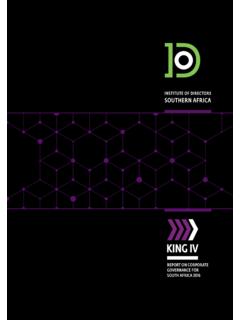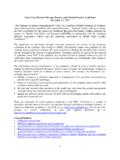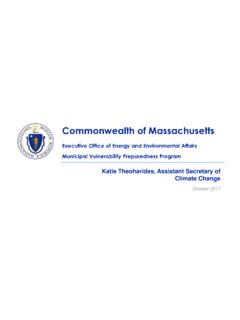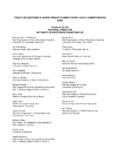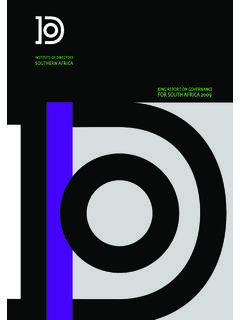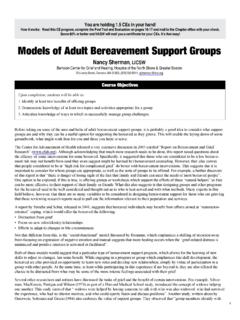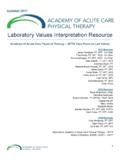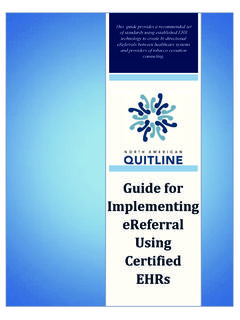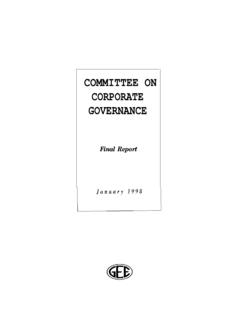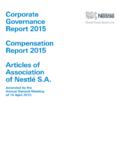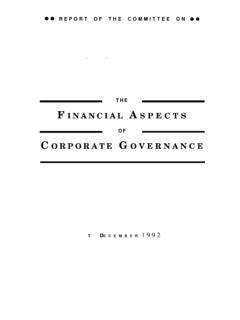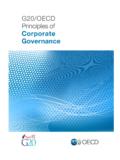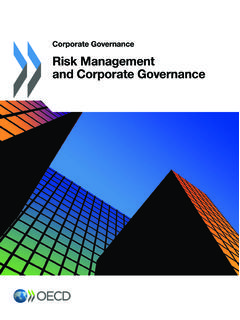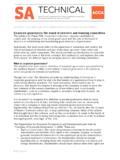Transcription of KIng IV Report on Corporate Governance for South …
1 Website VersionREPORT ON Corporate Governance FOR South AFRICA 2016 Website VersionThe Institute of Directors in Southern Africa and the King Committee on Corporate Governance in South Africa acknowledge with appreciation those who support the King IV Report and Corporate Governance in South Africa through their SponsorsACKNOWLEDGEMENTSW ebsite VersionThe Institute of Directors in Southern Africa and the King Committee on Corporate Governance in South Africa acknowledge with appreciation those who support King IV and Corporate Governance in South Africa through their endorsements. Each endorsement indicates support for the principles as espoused by this can be accessed at: King IV Report is dedicated to all those from the King Committee and outside it, even beyond the borders of South Africa, who so generously gave of their time and knowledge to contribute to the development of its Ramalho King IV Project Lead, Institute of Directors in Southern Africa1 November 2016 Gold SponsorsDF King LimitedDiligent Boardbooks Limited JSE Limited Link Market Services South Africa (Pty) Limited Nkonki Inc Oasis Water (Pty) Ltd SBV Services Proprietary Ltd 4 Africa Exchange (Pty) Limited Transnet SOC Ltd The South African Institute of Chartered AccountantsWebsite Version1 GLOSSARY OF TERMSPage 82 FUNDAMENTAL CONCEPTSPage 193 KING IV APPLICATION AND DISCLOSUREPage 345 KING IV CODE ON Corporate GOVERNANCEPage 42 Part : Leadership, ethics and Corporate citizenshipPart.
2 Strategy,performance and reportingPart : Governing structures and delegationPart : Governance functional areasPart : Stakeholder relationships6 SECTOR SUPPLEMENTSPage 74 Part : Introduction to sector supplements Part : Supplement for municipalities Part : Supplement for non-profit organisations Part : Supplement for retirement funds Part : Supplement for small and medium enterprisesPart : Supplement for state-owned entities7 CONTENT DEVELOPMENT PROCESS AND KING COMMITTEEPage 1184 KING IV ON A PAGEPage 39 FOREWORDINDEXW ebsite Version 2016 THE INSTITUTE OF DIRECTORS IN SOUTHERN AFRICA NPC. ALL RIGHTS Institute of Directors in Southern Africa NPC owns all copyright and titles in the King IV Report on Corporate Governance for South Africa, 2016 (hereafter referred to as King IV Report ) in its entirety, inclusive of all parts, sections, chapters and supplements that make up the King IV Report .
3 Fair use of the King IV Report is permitted to the extent stated in terms of the Copyright Act No. 98 of 1978, as amended, for research, private study, personal and private use, criticism, review or reporting of current events. To the extent that the reproduction of the King IV Report extends beyond the permitted scope of fair use , prior written permission and acknowledgment of the Institute of Directors in Southern Africa NPC is required in terms of the King IV Intellectual Property Policy (as amended). The Institute of Directors in Southern Africa NPC reserves its right to charge a royalty fee for the use Institute of Directors in Southern Africa NPC has several registered trademarks related to the King IV Report and its rights in relation thereto must be respected and adhered to. Any use of the must not create any misrepresentation of ownership or relationship with the Institute of Directors in Southern Africa NPC and must be used in accordance with the King IV Intellectual Property Policy (as amended).
4 Trademarks the Institute of Directors in Southern Africa NPC has in relation to King IV include, inter alia, the following: King IV King IV Report King IV Code King IV Report on Corporate Governance The Institute of Directors in Southern Africa NPC sees any infringement of its King IV Report copyright and trademark rights in a serious light. The Institute of Directors in Southern Africa NPC strictly reserves its rights, in all respects, in relation to the King IV Report and shall protect this within the full ambit of the law. COPYRIGHT AND TRADEMARKSW ebsite Version2 2016 THE INSTITUTE OF DIRECTORS IN SOUTHERN AFRICA NPC. ALL RIGHTS Version 2016 THE INSTITUTE OF DIRECTORS IN SOUTHERN AFRICA NPC. ALL RIGHTS 21st Century has been characterised by fundamental changes in both business and society. These fundamental changes provided the context within which the King Committee set out to draft King IV, and have influenced both its content and approach.
5 New global realities are testing the leadership of organisations on issues as diverse as inequality, globalised trade, social tensions, climate change, population growth, ecological overshoot, geopolitical tensions, radical transparency and rapid technological and scientific advancement. The United Nations Sustainable Development Goals, which were agreed by all governments in 2015, the Africa 2063 Agenda and the ( South African) National Development Plan 2030 (NDP) have a common theme of value creation that is accomplished in a sustainable manner. This is a fundamental concept of King CHANGED WORLDF inancial instability is one driver of these changes. Financial crises arising out of the capital crisis in the United States of America and the Sovereign Fund crisis in the European Union have still not been resolved. Brexit created further uncertainty for financial change driver is climate change. Even those who are skeptical about the scientific evidence for climate change, or who question whether climate change is attributable to human agency or simply part of a longer-term cycle, have to acknowledge that the world has experienced extreme weather conditions that pose new risks in the last several is a reality that organisations and individuals are using natural assets faster than nature is regenerating them.
6 This ecological overshoot will be exacerbated by continued population growth on the African and Asian continents. The global population is currently at billion, and could reach billion by 2045 according to the United Nations. Consequently, the pressure on natural assets will increase, as they are finite; continuing business as usual is no longer an option. Ubiquitous social media platforms are creating a world characterised by radical transparency. Corporations can no longer conceal their actions or secrets. Technological advances, including the emergence of the Internet of things, are generating huge amounts of data; more importantly, sophisticated analytics is converting that data into deep insight into the behaviour of humans and their organisations. Technology s disruptions continue. At present, advances in robotics, artificial intelligence, 3D printing, nanotechnology and biotechnology are accelerating the transformation of production and supply chains and forcing professions like law and accounting to reinvent themselves.
7 Indeed, so profound are the disruptions to industries and business models that many believe we are in the midst of the Fourth Industrial Revolution. There are greater expectations from stakeholders than ever before. Activism by civil society and shareholders have rocked companies over the last few years. The Millennial Generation (Millennials), roughly those born since 1980, is now the most numerous age cohort. Their concerns are beginning to set the global agenda. Millennials have shown that they are concerned about the global environmental crunch much more than the global financial crises. They are consequently attracted to companies who have integrated the six capitals into their business models. (The six capitals, as set out in the International Integrated Reporting Council s (IIRC) Integrated Reporting <IR> Framework, are financial, manufactured, human, intellectual, natural and social and relationship capital.)
8 FOREWORD Website Version4 2016 THE INSTITUTE OF DIRECTORS IN SOUTHERN AFRICA NPC. ALL RIGHTS a similar vein, it is now accepted that organisations operate in the triple context of the economy, society and the environment. How they make their money does have an impact on these three elements and, in turn, they impact on the context of all the above, governing bodies have the challenge of steering their organisations to create value in a sustainable manner, making more but with less to meet the needs of a growing population and the reality of dwindling natural corollary is that the duty of care has become both more complex and more necessary. No governing body today can say it is not aware of the changed world in which it is directing an organisation. Consequently, a business judgement call that does not take account of the impacts of an organisation s business model on the triple context could lead to a decrease in the organisation s Friedman s epigram, The social responsibility of business is to increase its profits , must now be interpreted in the light of the view that an organisation is a part of society in its own right.
9 It can no longer be seen as existing in its own narrow universe (or society ) of internal stakeholders and the resources needed to create value it also operates in, and forms part of, general society. In this view, the licensor of an organisation is not just those individuals and entities within its narrowly defined value chain, but society as a whole. THE THREE SHIFTS IN THE Corporate WORLDC ertain concepts form the foundation stones of King IV. They are: ethical leadership, the organisation in society, Corporate citizenship, sustainable development, stakeholder inclusivity, integrated thinking and integrated reporting. These concepts are relevant to three connected paradigm shifts in the Corporate financial capitalism to inclusive capitalismThere is now general acceptance that the employment, transformation and provision of financial capital represent only a fraction of an organisation s activities.
10 Instead, inclusive capitalism takes account of the employment, transformation and provision of all sources of capital the six capitals in order to reposition capitalism as the engine of shared prosperity. It gives parity to the sources of value performance alone can no longer serve as proxy for holistic value creation. As stated by Jonathan Labrey from the IIRC: Long-term financial performance depends on the efficient and productive management of resources not currently measured by traditional accounting methodologies human, intellectual, social and relationship, and natural capitals. The financial capital market system is insufficient to guard against the multi-faceted and interconnected risks of the future and hence an inclusive market system should be adopted. 1 This new way of thinking, known as inclusive capitalism, has the potential to trigger profound change. One is that, instead of simply providing aid to developing countries, developed country companies that are operating in more developing countries should focus on adopting the model of inclusive capitalism in the developing country, and thereby create value in a sustainable manner.
